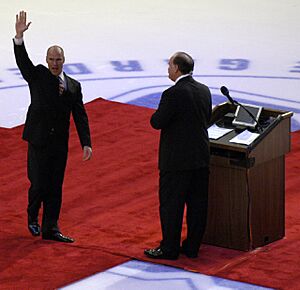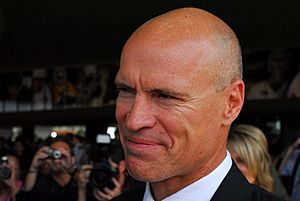Mark Messier facts for kids
Quick facts for kids Mark MessierOC |
||||||||||||||||||||||||||||
|---|---|---|---|---|---|---|---|---|---|---|---|---|---|---|---|---|---|---|---|---|---|---|---|---|---|---|---|---|
| Hockey Hall of Fame, 2007 | ||||||||||||||||||||||||||||
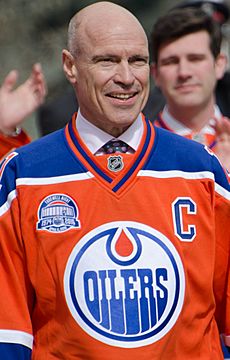
Messier in 2016
|
||||||||||||||||||||||||||||
| Born | January 18, 1961 St. Albert, Alberta, Canada |
|||||||||||||||||||||||||||
| Height | 6 ft 2 in (188 cm) | |||||||||||||||||||||||||||
| Weight | 210 lb (95 kg; 15 st 0 lb) | |||||||||||||||||||||||||||
| Position | Forward | |||||||||||||||||||||||||||
| Played for | Indianapolis Racers Cincinnati Stingers Edmonton Oilers New York Rangers Vancouver Canucks |
|||||||||||||||||||||||||||
| National team | ||||||||||||||||||||||||||||
| NHL Draft | 48th overall, 1979 Edmonton Oilers |
|||||||||||||||||||||||||||
| Playing career | 1978–2004 | |||||||||||||||||||||||||||
|
Medal record
|
||||||||||||||||||||||||||||
Mark Messier is a famous Canadian ice hockey player. He played as a forward for 25 seasons in the National Hockey League (NHL). His career lasted from 1979 to 2004.
Messier played for the Edmonton Oilers, New York Rangers, and Vancouver Canucks. He also played for other teams before joining the NHL. He was the last player active in major North American sports to have played in the 1970s.
Many people think Messier is one of the best hockey players ever. He is second in all-time playoff points with 295. He is also third in regular season games played (1756) and regular season points (1887).
Messier won the Stanley Cup six times. He won five Cups with the Oilers and one with the Rangers. He is the only player to be the captain of two different teams that won the Stanley Cup.
In New York, his leadership helped the Rangers win the Stanley Cup in 1994. This ended a 54-year wait for the team. Fans nicknamed him "The Messiah" because of his amazing leadership. He was also known as "The Moose" for his strength.
Messier won the Hart Memorial Trophy twice as the league's most valuable player. He won it in 1990 and 1992. In 1984, he won the Conn Smythe Trophy as the most valuable player in the playoffs. He was chosen for the NHL All-Star Game 16 times.
In 2007, he was added to the Hockey Hall of Fame. In 2017, he was named one of the "100 Greatest NHL Players" in history. On June 30, 2017, he was honored with the Order of Canada. This award recognized his hockey career and his work encouraging kids to play the sport.
Contents
Growing Up and Early Hockey
Mark's Family and Hometown
Mark Messier was born on January 18, 1961, in St. Albert, Alberta, Canada. His parents were Mary-Jean and Doug Messier. Mark was the third of four children.
When Mark was young, his family moved to Portland, Oregon. His dad, Doug, played hockey there for the Portland Buckaroos. The family moved back to St. Albert in 1969. Mark went to St. Francis Xavier High School in Edmonton. His dad was his coach and helped him a lot in his early hockey years.
Mark's brother, Paul, was also drafted by an NHL team. He played a few games before having a long career in Germany. Mark's cousins, Mitch and Joby, also played in the NHL. Joby even played briefly with Mark on the Rangers.
Mark's Hockey Journey
Starting in Junior Hockey
In 1976, Mark Messier tried out for the Spruce Grove Mets. This was a junior hockey team in the Alberta Junior Hockey League (AJHL). Mark was only 15, and the age limit was 20. His dad, Doug, was coaching the team.
Mark surprised everyone and made the team. In the 1976–77 season, he scored 66 points in 57 games. The next season, the team moved to St. Albert and became the St. Albert Saints. Mark was named captain and scored 74 points in 54 games. After that season, he played in 7 playoff games for the Portland Winterhawks in the Western Hockey League (WHL).
Playing in the WHA
Before the 1978–79 season, Mark felt he was too good for the AJHL. He wanted to play at a higher level. His dad contacted Pat Stapleton, who coached the Indianapolis Racers in the World Hockey Association (WHA). The Racers needed a player to replace Wayne Gretzky.
Mark signed a short tryout contract with the Racers. He played 13 games with the Saints before joining the Racers in November. He played four games with Indianapolis. The team later folded, and Mark didn't get paid for those games.
He then signed with another WHA team, the Cincinnati Stingers. He played 47 games for the Stingers. Mark scored his first professional goal on March 20, 1979.
Joining the Edmonton Oilers (1979–1991)
The WHA league closed down after the 1978–79 season. Four of its teams, including the Oilers, joined the NHL. Mark Messier was eligible for the 1979 NHL Entry Draft. The Edmonton Oilers picked him 48th overall.
Mark didn't agree to the Oilers' first contract offers. But he eventually signed with them. In his first NHL year, he had some issues. He missed a team flight and was sent to a minor league team for four games. After returning, he moved back in with his parents.
Messier was a very strong and competitive player. His leadership in the locker room was as important as his goals. He wasn't known for scoring a lot at first. But his scoring improved each year with the Oilers. In the 1981–82 season, he scored 50 goals. He often played on a line with Glenn Anderson.
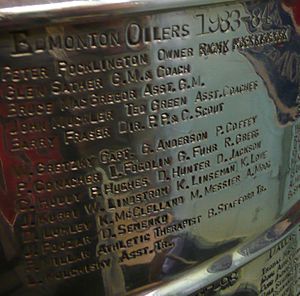
Mark started as a left-winger. But in the 1984 playoffs, he switched to playing center. This change worked very well. In Game 3 of the 1984 Finals, the Oilers were losing to the New York Islanders. Messier scored a brilliant goal that helped the Oilers come back. The Oilers won their first Stanley Cup that year. Messier won the Conn Smythe Trophy as the playoff MVP.
He won four more Stanley Cups with the Oilers: in 1985, 1987, 1988, and 1990. In 1990, he was the captain when the Oilers won the Cup. This win was special because it happened two years after Wayne Gretzky was traded away. Messier also won the Hart Memorial Trophy as the league's MVP that season.
After the 1990–91 season, Messier was unhappy with the Oilers. He wanted the team to keep important players like Adam Graves. Messier publicly asked to be traded. On October 4, 1991, the Oilers traded Messier to the New York Rangers.
New York Rangers (1991–1997)
In his first season with the Rangers, Messier won his second Hart Trophy. He led the Rangers to the best record in the NHL. However, they lost in the playoffs to the Pittsburgh Penguins.
In 1992–93, the Rangers did not make the playoffs. This was the first time in Messier's career he missed the postseason. After that season, Mike Keenan became the new head coach.
In the 1993–94 season, the Rangers played great again and finished first overall. Everyone expected them to win the Stanley Cup. They easily won their first two playoff rounds. But the next challenge was much harder.
In the 1994 Eastern Conference Finals, the Rangers were playing their rivals, the New Jersey Devils. The Rangers were losing the series 3–2. In Game 6, they were also down 2–0. Messier famously told the New York media that the Rangers would win Game 6.
He kept his promise by scoring three goals in the third period. This helped the Rangers win 4–2. The Rangers then won the series in a thrilling Game 7.
In the Stanley Cup Finals, Messier scored the winning goal in Game 7. This gave the Rangers their first Stanley Cup in 54 years. He became the first player to captain two different teams to a Stanley Cup win.
Two famous images came from that Stanley Cup win. One shows Messier jumping with joy as the final buzzer sounded. The other shows him holding the Stanley Cup with great emotion. New York City celebrated with a huge parade. The mayor called Messier "Mr. June."
In the 1995–96 season, Messier had 99 points. He was 35 years old and still playing at a very high level. In 1996–97, his former Oilers teammate Wayne Gretzky joined the Rangers. Messier remained the captain. They led the team to the Eastern Conference Finals. But they lost to the Philadelphia Flyers. This was the last playoff appearance for both Messier and Gretzky.
Messier wanted to finish his career with the Rangers. But the team decided not to offer him the contract he wanted. So, Messier left the Rangers.
Vancouver Canucks (1997–2000)
At 36 years old, Messier signed with the Vancouver Canucks. His return to Canada was a big event. But things quickly became difficult.
Before the season, the Canucks' captain, Trevor Linden, gave his captaincy to Messier. Many Canucks fans did not like this decision. Messier also asked for his jersey number, No. 11. This number had been unofficially retired by the Canucks after Wayne Maki passed away. This also upset many fans.
Messier's time with the Canucks was tough. The team missed the playoffs during his three years there. He scored 60 points in his first season, which was his lowest in a full year since his first NHL season. His next two seasons were shorter due to injuries.
When Messier played his first game back in New York against the Rangers, the fans gave him a warm welcome. He even scored a goal against his old team and received applause. But his time in Vancouver was not as successful. The team did not try to re-sign him, and he became a free agent in 2000.
Back to New York (2000–2004)
After three years, Messier returned to the New York Rangers for the 2000–01 season. His former coach, Glen Sather, was now the Rangers' general manager. To welcome Messier back, the Rangers held a press conference. The current captain, Brian Leetch, gave the captaincy back to Messier. Messier even promised that the Rangers would make the playoffs again.
Messier had a good season in 2000–01, scoring 67 points at age 40. This showed he was still a valuable player. However, the Rangers missed the playoffs again. He missed half of the 2001–02 season due to an arm injury.
On November 4, 2003, Messier scored two goals against the Dallas Stars. This moved him past Gordie Howe into second place on the all-time point scoring list. Only Wayne Gretzky had more points.
Eleven days later, Messier was the only active player to play in the Legends Game at the NHL Heritage Classic in Edmonton. He played with former Oilers players. In his last game at Madison Square Garden on March 31, 2004, fans cheered for him every time he touched the puck. After the game, he received a long standing ovation.
The NHL lockout canceled the next season. On September 12, 2005, Mark Messier officially announced his retirement. He played 1,756 regular season NHL games, which is third all-time. Messier holds the record for most NHL regular season and playoff games combined, with 1,992. He is one of the few players to play 25 NHL seasons, spanning four decades.
Playing for Canada
Messier played for Team Canada several times. He won a silver medal at the 1989 World Championships in Sweden. He also won three straight Canada Cups. He played for the Canadian team that finished second at the 1996 World Cup of Hockey. He called these tournaments his "real opportunity to play international hockey."
After Hockey
On January 12, 2006, the New York Rangers retired Messier's jersey number 11. This means no other Rangers player will wear that number. It was a very emotional ceremony with many of his 1994 Stanley Cup teammates. The Edmonton Oilers also retired his number on February 27, 2007.
In November 2007, Messier was inducted into the Hockey Hall of Fame. He also coached Team Canada in two European tournaments in 2010.
Messier also gives out the Mark Messier Leadership Award in the NHL. This award goes to a player who shows great leadership on the ice and in their community.
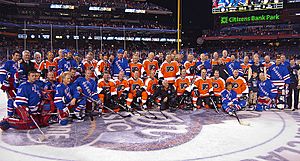
Messier stays active in New York City. He played in the 2012 NHL Winter Classic Alumni Game in Philadelphia. He also ran in the New York City Marathon in 2011. Messier is involved in building the Kingsbridge National Ice Center in the Bronx. This will be a huge indoor ice facility with nine rinks.
After retiring, Messier appeared on TV as a hockey analyst. He also appeared in commercials for Lay's chips in Canada and the U.S.
Personal Life
Mark Messier has a son named Lyon, born in 1987. Lyon also played professional hockey as a defenseman. Mark and his wife Kim have another son and a daughter.
Messier owns a club called Runaway Hill Club in the Bahamas. He also supports preventative healthcare.
Career Statistics
| Regular season | Playoffs | |||||||||||||
|---|---|---|---|---|---|---|---|---|---|---|---|---|---|---|
| Season | Team | League | GP | G | A | Pts | PIM | GP | G | A | Pts | PIM | ||
| 1975–76 | Sherwood Spears | AMHL | 44 | 82 | 76 | 158 | 38 | — | — | — | — | — | ||
| 1976–77 | Spruce Grove Mets | AJHL | 57 | 27 | 39 | 66 | 91 | — | — | — | — | — | ||
| 1977–78 | St. Albert Saints | AJHL | 54 | 25 | 49 | 74 | 194 | — | — | — | — | — | ||
| 1977–78 | Portland Winter Hawks | WCHL | — | — | — | — | — | 7 | 4 | 1 | 5 | 2 | ||
| 1978–79 | St. Albert Saints | AJHL | 17 | 15 | 18 | 33 | 64 | — | — | — | — | — | ||
| 1978–79 | Indianapolis Racers | WHA | 5 | 0 | 0 | 0 | 0 | — | — | — | — | — | ||
| 1978–79 | Cincinnati Stingers | WHA | 47 | 1 | 10 | 11 | 58 | 3 | 0 | 0 | 0 | 0 | ||
| 1979–80 | Houston Apollos | CHL | 4 | 0 | 3 | 3 | 4 | — | — | — | — | — | ||
| 1979–80 | Edmonton Oilers | NHL | 75 | 12 | 21 | 33 | 120 | 3 | 1 | 2 | 3 | 2 | ||
| 1980–81 | Edmonton Oilers | NHL | 72 | 23 | 40 | 63 | 102 | 9 | 2 | 5 | 7 | 13 | ||
| 1981–82 | Edmonton Oilers | NHL | 78 | 50 | 38 | 88 | 119 | 5 | 1 | 2 | 3 | 8 | ||
| 1982–83 | Edmonton Oilers | NHL | 77 | 48 | 58 | 106 | 72 | 15 | 15 | 6 | 21 | 14 | ||
| 1983–84 | Edmonton Oilers | NHL | 73 | 37 | 64 | 101 | 165 | 19 | 8 | 18 | 26 | 19 | ||
| 1984–85 | Edmonton Oilers | NHL | 55 | 23 | 31 | 54 | 57 | 18 | 12 | 13 | 25 | 12 | ||
| 1985–86 | Edmonton Oilers | NHL | 63 | 35 | 49 | 84 | 70 | 10 | 4 | 6 | 10 | 18 | ||
| 1986–87 | Edmonton Oilers | NHL | 71 | 37 | 70 | 107 | 73 | 21 | 12 | 16 | 28 | 16 | ||
| 1987–88 | Edmonton Oilers | NHL | 70 | 37 | 74 | 111 | 103 | 19 | 11 | 23 | 34 | 29 | ||
| 1988–89 | Edmonton Oilers | NHL | 72 | 33 | 61 | 94 | 130 | 7 | 1 | 11 | 12 | 8 | ||
| 1989–90 | Edmonton Oilers | NHL | 79 | 45 | 84 | 129 | 79 | 22 | 9 | 22 | 31 | 20 | ||
| 1990–91 | Edmonton Oilers | NHL | 53 | 12 | 52 | 64 | 34 | 18 | 4 | 11 | 15 | 16 | ||
| 1991–92 | New York Rangers | NHL | 79 | 35 | 72 | 107 | 76 | 11 | 7 | 7 | 14 | 6 | ||
| 1992–93 | New York Rangers | NHL | 75 | 25 | 66 | 91 | 72 | — | — | — | — | — | ||
| 1993–94 | New York Rangers | NHL | 76 | 26 | 58 | 84 | 76 | 23 | 12 | 18 | 30 | 33 | ||
| 1994–95 | New York Rangers | NHL | 46 | 14 | 39 | 53 | 40 | 10 | 3 | 10 | 13 | 8 | ||
| 1995–96 | New York Rangers | NHL | 74 | 47 | 52 | 99 | 122 | 11 | 4 | 7 | 11 | 16 | ||
| 1996–97 | New York Rangers | NHL | 71 | 36 | 48 | 84 | 88 | 15 | 3 | 9 | 12 | 6 | ||
| 1997–98 | Vancouver Canucks | NHL | 82 | 22 | 38 | 60 | 58 | — | — | — | — | — | ||
| 1998–99 | Vancouver Canucks | NHL | 59 | 13 | 35 | 48 | 33 | — | — | — | — | — | ||
| 1999–2000 | Vancouver Canucks | NHL | 66 | 17 | 37 | 54 | 30 | — | — | — | — | — | ||
| 2000–01 | New York Rangers | NHL | 82 | 24 | 43 | 67 | 89 | — | — | — | — | — | ||
| 2001–02 | New York Rangers | NHL | 41 | 7 | 16 | 23 | 32 | — | — | — | — | — | ||
| 2002–03 | New York Rangers | NHL | 78 | 18 | 22 | 40 | 30 | — | — | — | — | — | ||
| 2003–04 | New York Rangers | NHL | 76 | 18 | 25 | 43 | 42 | — | — | — | — | — | ||
| NHL totals | 1,756 | 694 | 1,193 | 1,887 | 1,912 | 236 | 109 | 186 | 295 | 244 | ||||
Awards and Honours
| Award | Year(s) |
|---|---|
| NHL All-Star Game | 1982, 1983, 1984, 1986, 1988, 1989, 1990, 1991, 1992, 1993, 1994, 1996, 1997, 1998, 2000, 2004 |
| NHL First All-Star Team | 1982, 1983, 1990, 1992 |
| Stanley Cup champion | 1984, 1985, 1987, 1988, 1990, 1994 |
| Conn Smythe Trophy | 1984 |
| NHL Second All-Star Team | 1984 |
| Hart Memorial Trophy | 1990, 1992 |
| Lester B. Pearson Award | 1990, 1992 |
| One of 100 Greatest NHL Players | 2017 |
Career Achievements
- Mark Messier is the only player to have been captain of two different Stanley Cup winning teams. He led both the Edmonton Oilers and New York Rangers to championships.
- In 1998, The Hockey News ranked him as the 12th greatest hockey player of all time.
- In 2006, the National Hockey League created the Mark Messier Leadership Award. This award is given to a player who shows great leadership on the ice and helps their community.
- His 1,887 points in the regular season are the third most in NHL history. Only Jaromír Jágr and Wayne Gretzky have more. Even with so many points, Messier never won a scoring title.
- He played 1,756 regular season NHL games. This is the third most games played in NHL history.
- He was the last active player in the NHL who had played in the 1970s.
- He was also the last active player who had played in the World Hockey Association (WHA).
- In June 2007, he was chosen for the Hockey Hall of Fame in his first year of eligibility. The ceremony took place in November 2007.
- In a 2009 book, he was ranked as the 4th greatest player in the history of the New York Rangers.
- In 2010, he was one of the first players inducted into the World Hockey Association Hall of Fame.
- Hockey Canada named him to the Order of Hockey in Canada in 2013.
See also
 In Spanish: Mark Messier para niños
In Spanish: Mark Messier para niños
- List of NHL statistical leaders
- List of NHL players with 1,000 points
- List of NHL career assists leaders
- List of NHL players with 500 goals
- List of NHL players with 1,000 games played
 | Jackie Robinson |
 | Jack Johnson |
 | Althea Gibson |
 | Arthur Ashe |
 | Muhammad Ali |


